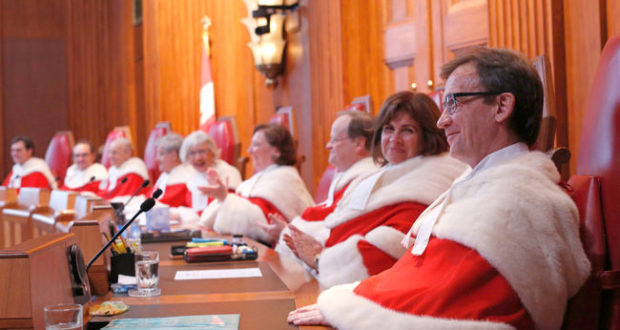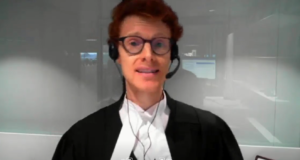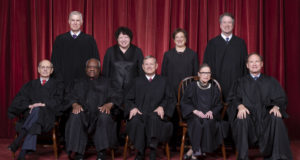This article is written in response to Asher Honickman’s recent article, “Reaffirming the Case for Constraint.” Mr. Honickman will post a reply to this article shortly, which will also address Mr. Sirota’s comments in a previous response entitled “Seven’s Sins“.
This article was originally published at Double Aspect, Mr. Sirota’s award-winning blog.
Asher Honickman has posted a reply to my post here on “How to Do Constitutional Adjudication” (which was itself a reply to some of his arguments in a previous essay “The Case for a Constrained Approach to Section 7” of the Canadian Charter of Rights and Freedoms). I would like to respond, focusing mostly on what I have been referring to as “democratic process failures” and their relevance to constitutional adjudication. I think that Mr. Honickman mis-characterizes my arguments on this point, but perhaps that’s because they were not clear enough to begin with.
* * *
First, though, a note on what is, as I know from conversation, a persistent but perhaps unimportant disagreement between Mr. Honickman and me. I wrote that
law generally, and constitutional law in particular, contains an ineradicable moral and ideological element, so that there is nothing wrong with perceiving judges as being ― in part ― moral agents and political actors. [Moreover], the Charter‘s text itself makes it inevitable that that judges will be making decisions touching on morality and politics.
Mr. Honickman responds by conceding that “[t]he judge can no more divorce herself from her subjective experiences, beliefs and values than can the historian, the economist, or the physician,” but arguing that “it does not follow that judges should embrace their fallibility.” He wants judges to be “constrained by a ‘rule of law’ culture” that will limit, if not altogether remove, the negative consequences of the judges’ inability to be entirely objective.
I have no quarrel with this, but think this misses the point I was trying to make, which is that moral values and ideology are not just something that judges bring into the law because they are fallible, but something it is built into the law ― perhaps into the very concept of law. Mr. Honickman’s example is a telling one: history, economics, and medicine are supposed to be amoral. They describe the world and suggest ways to change it, but whatever values their practitioners bring to their craft are external to the disciplines themselves. Law is different. It has, Lon Fuller argued, an “internal morality.” It is, Jeremy Waldron says, inherently protective of human dignity. The Rule of Law, which Mr. Honickman wants judges to uphold, is itself a moral concept. (This view is not universal ― Joseph Raz, in particular, famously challenged it. But I find it quite persuasive.)
What I meant, then, when I wrote that law is necessarily moral and ideological was not only, and not so much, that judges will inevitably fail to avoid bringing their subjective values into their work ― though they will, and I agree with Mr. Honickman that this is regrettable. What I meant is that even when judges perform their work to perfection and only apply such principles as can be readily inferred from the constitutional text (the Rule of Law, federalism, and democracy, say) and many of the text’s explicit guarantees (I’d mentioned freedom of religion, equality, and protection against unreasonable search and seizure), they are already engaged in a moral and ideological endeavour. The proper response to the unreconstructed Marxist or the social justice warrior who dismisses the Rule of Law and the rest of it as bourgeois ideology is not to say that it’s not, but to admit that it is, and that you will keep sticking to that ideology because it helps prevent Gulags instead of building them. That said, in practice, little turns on the difference between these two responses.
* * *
Coming back to the issue of democratic process failures, my contention was not ― as it seems to me that Mr. Honickman took it to be ― that these provide a self-standing ground for judicial intervention, regardless of constitutional text or doctrine. The text, in particular, remains the overarching limit on judicial power, the law to which this power is subordinate. Doctrine is a more complicated case, and perhaps the ground of some disagreement between Mr. Honickman and me, because I would favour a somewhat less stringent approach to stare decisis than Mr. Honickman might prefer. Still, I share Mr. Honickman’s belief in the importance of constraint.
My reference to democratic process failures ― as well as that to pervasive political ignorance ― was specifically in response to Mr. Honickman’s insistence that the legislatures’ ability to resolve moral issues means that judges do not need to do so. Legislatures, I argued, will often fail to address moral issues, or will address them in ways that have little to do with the voters’ preferences or interests, and much to do with the interests of the legislators. The point is not that courts have a roving commission to find out and correct cases when this occurs, but that they should not hesitate to make moral judgments ― when authorized or required to do so by the constitutional text (and doctrine) ― under the pretext that the legislatures will take care of this.
I originally spoke of democratic process failure in my comment on Carter v. Canada (Attorney General), 2015 SCC 5, [2015] 1 S.C.R. 331, where the Supreme Court held that a blanket prohibition on medically-assisted suicide was inconsistent with section 7 of the Charter. Although there were problems with the way the Supreme Court articulated that decision, its interpretation of section 7 was at least plausible ― and in my view correct ― in light of the constitutional text and the doctrine as it had developed in the years since the Court first answered that question in Rodriguez v. British Columbia (Attorney General), [1993] 3 S.C.R. 519. The point of my discussion of democratic process failure was to address concerns about the “counter-majoritarian difficulty” said to be inherent in judicial review. Because of such failures, it is not the case that judicial review is always counter-majoritarian (though of course it often is).
This example shows that any court empowered to review the constitutionality of legislation is ipso facto “empowered to correct ‘democratic process failures,’” ― and thus that Mr. Honickman need not worry that such correction “will necessarily be ‘instrumentalist,’ finding and affirming rights that are not supported by the Charter itself, but which, in the judges’ view, make for good social policy.” To repeat, the Charter’s provision remain the source of the court’s authority and at the same time the constraint on this authority, while democratic process failure is the reason for which that authority is invoked. Accordingly, when faced with what it thinks is a democratic process failure, the Court’s role is not to figure out the preferences of a majority ― which, as Mr. Honickman correctly points out, may not be determinate ― but simply to do usual judicial task and invalidate the impugned statute or government decision if it is contrary to the constitution. At most, the presence of a failure obviates the case, if any, for judicial deference to the other branches of government.
I agree with Mr. Honickman that the questions that I raised about democratic process failures ― most basically, how do we know, and how can a court know, that one has occurred ― are difficult to answer, though it’s not clear to me that there can be “no objective standard” to help in the enterprise. But this difficulty does not undermine the case for judicial intervention, because, and so long as, that intervention is justified on another ground ― namely that of inconsistency between the government’s action and the constitution. Whether a democratic process failure has occurred might influence the deference that the court ought to show the government’s decision-making process, but the basic propriety of judicial intervention does not turn the answer to this question.
Ultimately, Mr. Honickman and I might be disagreeing less about the judicial role than about democratic theory. Where I see “persistent inability of the democratic process to produce laws that majorities would agree with and find desirable,” Mr. Honickman sees “legislatures [that] do not base their decisions on the polls at any given time and look instead to the national interest.” The fact, which he acknowledges, that a passionate (or, I would add, strongly self-interested) and well-organized minority can prevail over the majority is not a bad thing in his view ― and, I suppose, fully consistent with the national interest. Even if democracy malfunctions, we should recall that it is “the worst system except for all the others” and correct its “imperfections … from within.” To me, this sounds like saying that because a free market is better than any alternative, we should not bother trying to correct market failures and hope that the market will correct itself, or that because government is necessary, our only response to government failure should be to improve regulatory mechanisms, instead of privatizing and deregulating. A few people accept the former argument, and many the latter, but to me, both seem fallacious. Democracy is indeed better than the alternatives, but if its shortcomings can be mitigated by means external to its normal processes ― such as judicial review, then so much the better.
* * *
I share Mr. Honickman’s concerns about judges exercising their power without the constraints of constitutional text and legal doctrine. However, I do not think that the proper response to these concerns is to say that judges ought to be entirely non-ideological, and that they should leave matters of moral judgment to the legislative process, however flawed that process is. Like Mr. Honickman, I believe that judges should be enforcing constitutional rules, but I do not mind acknowledging the moral and ideological dimensions of many of these rules as well as the shortcomings of democracy, which judicial review can help remedy.
 Advocates for the Rule of Law
Advocates for the Rule of Law



